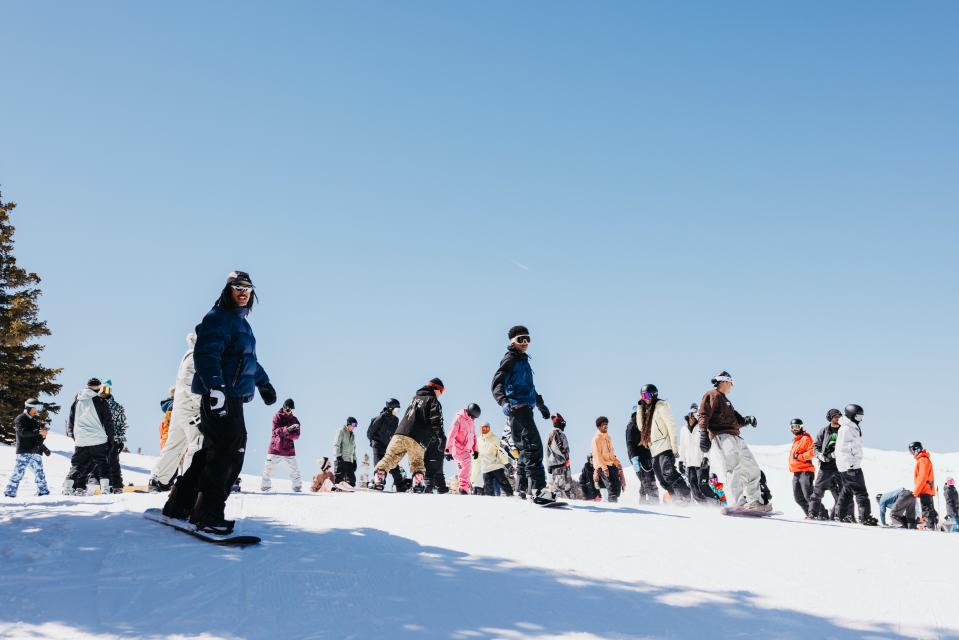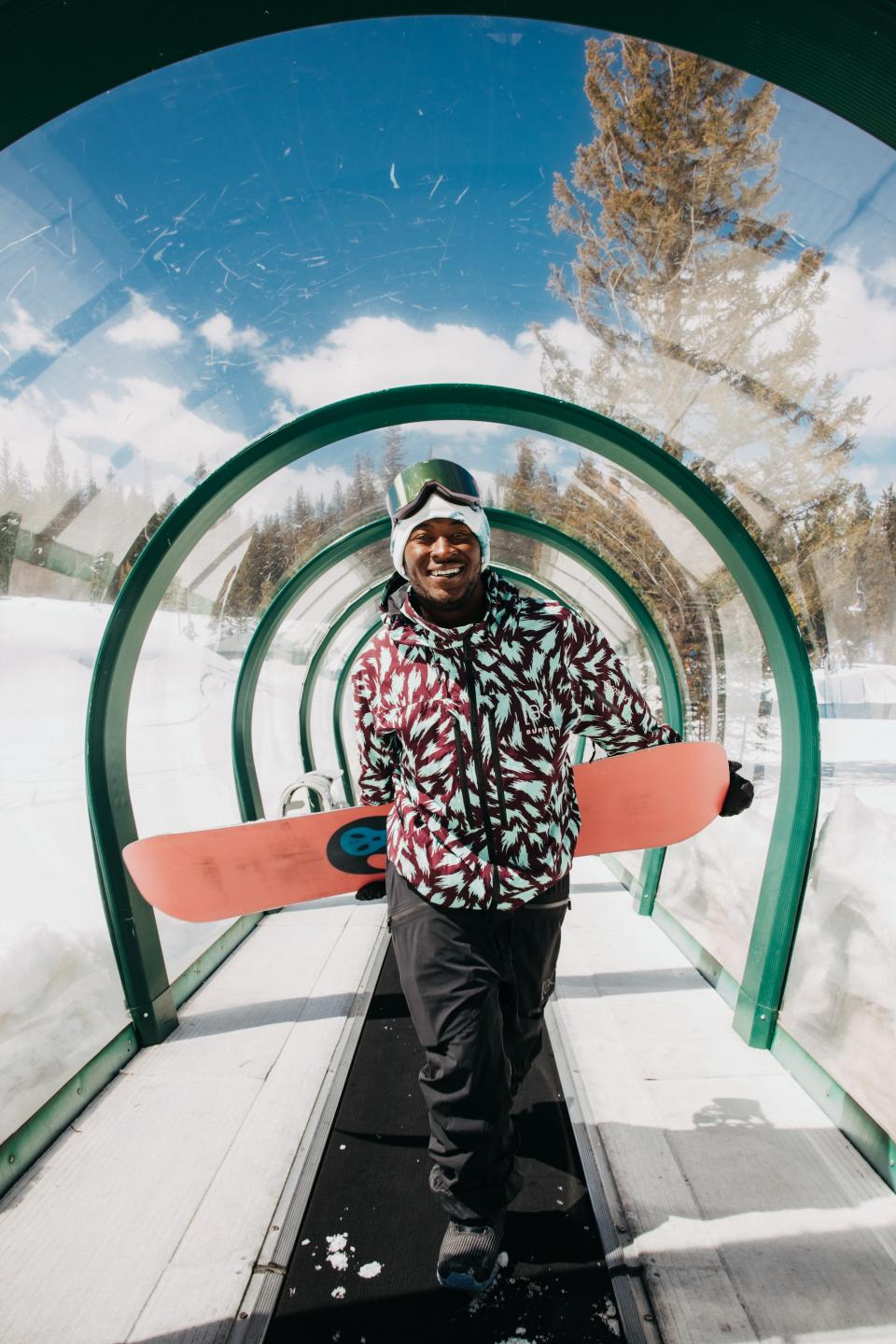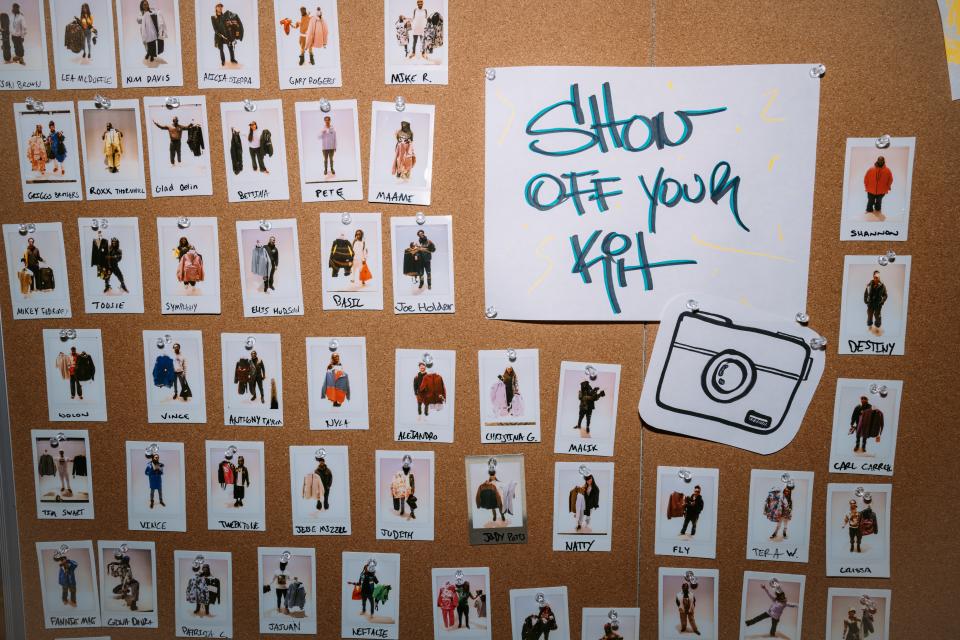“There's a Whole Crew Now”: Inside the Effort to Bust Snowboarding's Barriers

Photographs: Courtesy of Burton, Getty Images; Collage: Gabe Conte
A casual observer could be forgiven for missing snowboarding’s Black history. The sport’s most heralded athlete, after all, is a rock-and-roll-loving redhead whose last name is White. And while the sport has produced a pantheon of Black pros, they’ve been few and far between. Only a couple have secured their own board model, and none have made the U.S. Olympic Team.
But Black riders are crucial to understanding snowboarding’s style, and trajectory. The sport’s pioneering pros include Russell Winfield and Stevie Bell, who, in hitting tricks on unorthodox objects, became leaders of the so-called “jib movement,” as well as Keir Dillon, Ben Hinkley, and Dillon Ojo. “Their style was distinct and flamboyant in a way where you had to pay attention,” said Selema Masekela, a long-time X Games commentator. “They had a sense of self-expression born from their unique experiences.”
This is evident, for instance, with Winfield, who drew on his roots in the San Diego skate scene to help pioneer street snowboarding. Hinkley, for his part, pushed forward flip tricks, including his signature: the lawn dart. Then there’s Dillon, who, in September 2001, landed on the cover of Transworld Snowboarding throwing a McTwist, shirtless, with boombox headphones on. “That shit was iconic,” said Masekela, a former Transworld staffer. “And Black as fuck.”

This legacy of innovation lives on with riders like Zeb Powell, a 24-year-old pro known for the “knuckle huck,” who along with with Masekela and George Carpenter, the oldest son of the late snowboarding godfather Jake Burton Carpenter, co-founded Culture Shifters: an annual summit formed in 2021 to show off and strengthen representation on the slopes.
Powell’s pure love of the sport is evident by his playful approach to the mountain. He maintained his light composure years ago when a skier at his home resort, in North Carolina, screamed the n-word at him. Powell responded with a resounding “Hell no!” then took off down the mountain.
“I wasn’t trying to be that mean, but I caught him at a flat slope, slashed his ski off, and he puttered to the ground,” he explained recently, on the heels of this year’s Culture Shifters, which included a bunch of shredding, but also conversations about the history and future of diversity in athletics moderated by Neftalie Williams, the director of San Diego State University’s Center for Skateboarding, Action Sports & Social Change. Black snowboarders were well represented, but there were also Indigenous riders and those from other backgrounds.
Culture Shifters provides representation in the form of pros, like Powell and fellow pro Brolin Mawejje, but also novices, including professional DJs, influencers, artists, and athletes from other leagues. Past participants include pro skater Zion Wright, Philadelphia Eagles tight end CJ Uzomah, and ASAP Ferg, who spread the sport’s gospel via a video montage, distributed by WorldStar, that showed the Harlem rapper shredding, and falling, on the bunny hill.
“There’s a whole crew now,” Masekela said. “And they’re starting to dictate how they show up in snowboard culture, as opposed to it being adopted by white kids who think it’s cool.” Case in point is a 2022 collection of Burton gear and outerwear spearheaded by Mawejje and Powell with the late Virgil Abloh, the profits of which went to support BIPOC snowboarding.
A core mission of Culture Shifters is to counter the sport’s overwhelmingly white and occasionally hostile environment by joyfully asserting Blackness. This serves, among other things, as an invitation for others to come out and play. “There’s this wrongheaded assumption that people of color don’t like winter,” said Judith Kasiama, a past Culture Shifters attendee and the co-founder of Colour the Trails, an organization that works to address systemic barriers to snow sports. “The truth is that they simply don’t see themselves visually represented in those environments.”
Mawejje credits snowboarding with providing him peace and positive assimilation after arriving in America as a refugee nearly two decades ago from Uganda. "I have blossomed by the mountains,” he said. But he’s also been called the n-word, and a “baboon.” For years, he covered his face with a ski mask no matter the weather, part of a desperate gambit to blend in.

While snow sports continue to be disproportionately white, there are positive signs of change. Survey data from Snowsports Industries America shows that Black snowboarding participation grew by nearly 14 percent over the last four seasons—while Latinx rates increased by a healthy 6.5 percent. This movement is thanks, in part, to organizations that introduce and subsidize the sport for inner-city and underserved populations, like Colour the Trails, Edge Outdoors, and the Chill Foundation, which, over its nearly three decades in existence, has served more than 30,000 youth. Chill’s greatest success story may be Mawejje, who nearly made the Uganda Olympic team in 2018 and 2022.
There’s also the advent of indoor ski arenas, like Big Snow, located at the American Dream megamall in New Jersey. It provides an accessible training ground for urban and suburban riders, like 16-year-old phenom LJ Henriquez. Similar centers are being considered for places for Austin, Dallas, and Fairfax, Virginia.
Perhaps the best way to understand this shift is through the story of Stevie Bell. Snowboarding came naturally to the Salt Lake City native. He first strapped in at 16. By 18, he’d landed his first video part. At 19, he secured his first major sponsorship deal. A major video part in Forum or Against ‘Em was released when Bell was 21—and shows an athlete on the upswing. “This is just the beginning for me,” he predicted at the time. In truth, it was the beginning of the end.
Bell’s premature exit from snowboarding was fueled, in part, by the 2008 financial crash, which temporarily devastated the industry. Bell kept throwing down, but he was losing sponsors and money. He soon started to worry that, were he to sustain a serious injury, he wouldn’t be able to afford his medical bills. Still, Bell stuck with the sport, only to find that, once the industry was on the rebound, nobody wanted to pick him up.
“People were claiming they didn't have money, but I could see other snowboarders getting deals,” Bell told me recently. “My talent was right there, matched with every white boy in the industry. I put my whole heart and soul into it, but I just didn't get that opportunity. And so, I was like, ‘You know what? If nobody wants me, then I'll walk away.”

Painful as it was, Bell ditched his board, packed up his life, and left the mountains. He landed in Long Beach, where he worked for a nutritional firm, then started a solar company. He rarely discussed his old life and didn’t publicize his new one, leading fans to wonder: where did he go?
Bell wouldn’t return to the slopes until 2022, when Russell Winfield, invited him to Big Bear. It was on this trip that Bell began to disentangle his love of the sport with the numerous factors that led him to flee, including mistreatment by the industry and the isolating feeling of being a Black pro in one of the world’s whitest sports. “I stuck out like a sore thumb, there were always eyes on me,” he recalled. “Over time, you get mentally ground down.” These mostly latent dynamics flared up in 2007, when Bell was roped into an ad campaign, which he now deeply regrets, that featured blackface.
In 2023, Bell was first invited to Aspen as an honored guest at Culture Shifters. There, he found himself snaking down a trail alongside dozens of other participants from diverse backgrounds. For once, he didn’t stand out, he fit in. “It was something I never thought I'd see in my lifetime,” he told me. “It blew my mind.”
Bell, now 38, is living in Utah again, and happy to be among the mountains, where a young, more diverse generation is navigating friendlier terrain. He excitedly returned to Culture Shifters this year, and has recently started teaching his four-year-old daughter to shred. “She's good already,” he bragged to me. “I'm like, damn!”
Originally Appeared on GQ

